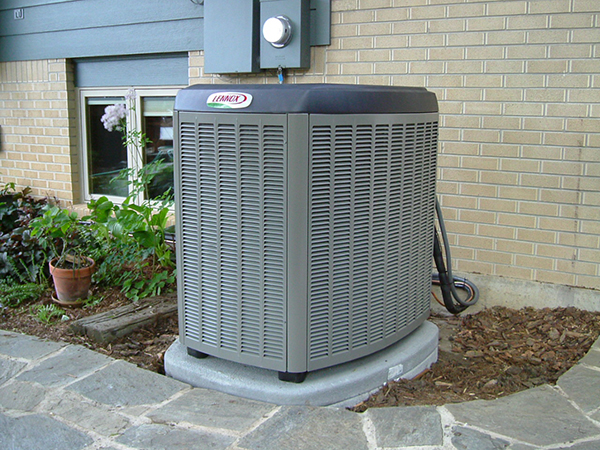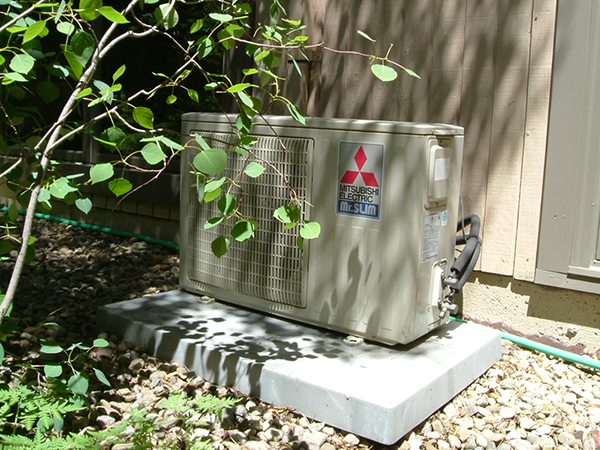How Loud is It? Sound Ratings of Popular Heat Pumps and AC Systems
 When it comes to purchasing a new air conditioning system, the sound levels that it puts out when operating can be an important factor in the decision-making process – especially if you have nearby neighbors or if the location of the outdoor unit is where you want it as quiet as possible for your own purposes. So what’s the easiest way to compare different products and brands in order to determine what will best meet your needs? The most objective way to make this comparison is to refer to the decibel (dB) rating listed for the different units.
When it comes to purchasing a new air conditioning system, the sound levels that it puts out when operating can be an important factor in the decision-making process – especially if you have nearby neighbors or if the location of the outdoor unit is where you want it as quiet as possible for your own purposes. So what’s the easiest way to compare different products and brands in order to determine what will best meet your needs? The most objective way to make this comparison is to refer to the decibel (dB) rating listed for the different units.
What is a Decibel?
In simple terms, dBs are units of measurement representing different levels of sound that a person hears. The sounds we hear on an average day usually fall between 0 dB and 120 dB on the very loud end. It’s worth mentioning that human beings perceive higher pitch sounds as louder (ex: sirens, chainsaws) as compared with lower pitched sounds (trucks, lawnmowers); dB ratings take this into account. There are of course additional details on the science of dB’s that we are not going to dig into here, but that doesn’t detract from the goal of this introductory discussion.
While 120 dB’s might seem like a fairly narrow range for all the sounds we hear each day, make note that an increase of 10 dB represents 10 times more sound energy, a significant jump at each and subsequent increases.
On the quieter end of the dB scale you will encounter sounds like:
- Rustling leaves, breathing (10dB)
- Whispering (15-20 dB)
- A clock ticking (30 dB)
- A library or office, bird songs (40-50 dB)
- Moderate rainfall (50 dB)
- Normal conversation (60 dB)
Meanwhile, the higher end of the dB scale includes sounds like:
- Vacuum cleaner, loud talk, busy restaurant (70 dB)
- Traffic, parade, airplane (80 dB)
- Jackhammer, lawnmower (90 dB)
- Metro train (100 dB)
- Car horn (110 dB)
- A chainsaw, thunderclap, rock concert (120 dB)
- Emergency vehicle siren (130 dB)
What Are The dB Ratings of Popular Heat Pumps and Air Conditioners?
When it comes to home comfort systems, quieter is always better! The lower the dB ratings the less impactful they’ll probably be in your everyday life. While not an end-all, having an understanding of the comparative sound levels of AC and heat pump systems that you’re considering purchasing, and having some common daily reference points such as the ones described above, can only help.
Following are the outdoor dB ratings of some of our most popular central and ductless mini-split air conditioners and heat pumps. Keep in mind that these are not necessarily the sound levels that you’ll here when sitting in your home:
Whole-House, Outdoor Condensing Units
 The Lennox SL28XCV central air conditioner and the SL25XPV central heat pump are both very high efficiency, variable-capacity units with cooling efficiency ratings up to 28 SEER; the XPV heat pumps also feature a heating efficiency rating of 11.8 HSPF. Both of these units have sound ratings as low as 59 dBs, or roughly in the same volume range as people speaking with an ‘inside voice.’
The Lennox SL28XCV central air conditioner and the SL25XPV central heat pump are both very high efficiency, variable-capacity units with cooling efficiency ratings up to 28 SEER; the XPV heat pumps also feature a heating efficiency rating of 11.8 HSPF. Both of these units have sound ratings as low as 59 dBs, or roughly in the same volume range as people speaking with an ‘inside voice.’
The XC20 central air conditioner and the XP20 central heat pump from Lennox are also high efficiency, variable-capacity units. Their cooling efficiencies are up to 20 SEER, and the XP20 heat pump has a heating efficiency up to 10.0 HSPF. The sound ratings of these unit are as low as 65 dBs, which is somewhere between the volume of an inside voice and a new vacuum cleaner.
The Lennox EL16XC1 central air conditioner and the EL16XP1 heat pump are traditional, single-stage units with cooling efficiencies up to 17 SEER, and are considered to be relatively high efficiency options for our area. The heating efficiency of the heat pump model is up to 9.8 HSPF. These units have sound ratings as low as 71 dB, which is somewhere in the range of a new vacuum cleaner and a busy restaurant.



Ductless Mini-Split Outdoor Units
 There are many different models of Mitsubishi ductless systems that are very popular with our customers – including Multi Zone systems that can heat and cool all the rooms in a home. Depending on the model, Mitsubishi outdoor condensing units have dB ratings ranging between 47 dB and 56 dB, similar to a moderate rainfall on the quiet end and the background noise of a modern refrigerator. Even Mitsubishi’s 8-to-1 Multi Zone system – an outdoor condenser that can power up to 8 indoor blower units – has an outdoor condenser sound rating below 60 dB.
There are many different models of Mitsubishi ductless systems that are very popular with our customers – including Multi Zone systems that can heat and cool all the rooms in a home. Depending on the model, Mitsubishi outdoor condensing units have dB ratings ranging between 47 dB and 56 dB, similar to a moderate rainfall on the quiet end and the background noise of a modern refrigerator. Even Mitsubishi’s 8-to-1 Multi Zone system – an outdoor condenser that can power up to 8 indoor blower units – has an outdoor condenser sound rating below 60 dB.
Due to the nature of ductless mini-split systems, which are not whole-home products, the outdoor sound levels of these products are typically lower than whole-house central air conditioners and heat pumps.
Ductless Mini-Split Indoor Blower Units
 Mitsubishi indoor blower units, which operate independently of central systems, also grade out very well for their sound levels when circulating air inside the home. In most cases, these models have 5- or 6-speed fans, and all units have indoor sound ratings between 20 dB and 49 dB, or somewhere between a quiet conversation and moderate rainfall.
Mitsubishi indoor blower units, which operate independently of central systems, also grade out very well for their sound levels when circulating air inside the home. In most cases, these models have 5- or 6-speed fans, and all units have indoor sound ratings between 20 dB and 49 dB, or somewhere between a quiet conversation and moderate rainfall.
For comparison, the very best rated window air conditioners have sound ratings that fall between 50 and 60 dB, significantly louder than mini-split indoor units. Now, this isn’t really comparing ‘apples to apples,’ because window air conditioners also contain the compressor, whereas ductless and central systems are split systems, with the condensing unit and compressor located on the ground outside of the house. Ductless systems, we readily admit, are also in a higher price range.
Questions on AC Sound Ratings in Denver-Boulder?
 Our team at Save Home Heat Company has the knowledge, experience, and expertise to help Boulder-Denver area homeowners find the right central or ductless home comfort solution for their specific needs. Supplying you with accurate sound level information and efficiency ratings of products you are considering purchasing is just one part of the equation.
Our team at Save Home Heat Company has the knowledge, experience, and expertise to help Boulder-Denver area homeowners find the right central or ductless home comfort solution for their specific needs. Supplying you with accurate sound level information and efficiency ratings of products you are considering purchasing is just one part of the equation.
Listening carefully to your input, patiently and fully answering all your questions, and providing options we feel make sense to consider in a friendly, low-pressure fashion is equally important. Please reach out to us today for professional assistance you can rely on.
Please contact me to discuss an air conditioner or heat pump system for my home!
Tags: Cooling, Heating



